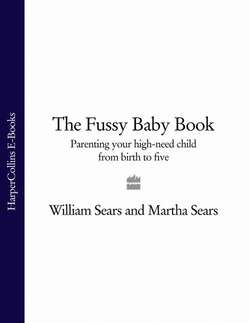Читать книгу The Fussy Baby Book: Parenting your high-need child from birth to five - Martha Sears - Страница 59
it’s not your fault
ОглавлениеParents, take heart! If you are responsive to your baby and try to keep him feeling secure in his new world, you need not feel that it’s your fault if your baby cries a lot. Nor is it your job to make your baby stop crying. Of course, you stay open to learning new things to help your baby, like a change in your diet (see Chapter 10), or a new way of wearing baby (see here), and you get your doctor involved if you suspect a physical cause behind the crying (see Chapter 10). But there will be times when you won’t know why your baby is crying – you’ll wonder if baby even knows why he’s crying. There may be times when baby needs to cry, perhaps because he just feels stressed. You needn’t feel desperate to make him stop after trying all the usual things. It’s a fact of new parent life that although babies cry to express a need, the style in which they do so is the result of their own temperament. Don’t take your baby’s cries personally. Your job is to create a supportive environment that lessens your baby’s need to cry, to offer a set of caring and relaxed arms so that your baby does not need to cry alone, and to do as much detective work as you can to figure out why your baby is crying and how you can help. The rest is up to your baby.
When I was confused about my mothering, I asked a seasoned, calm, impartial mother to observe how I handled my baby on a typical day in my home. Even though I know I am the expert on my own baby, sometimes it is hard to be objective, and the voice of experience can be helpful.
Letting baby cry desensitizes mother. Not only is the cry-it-out advice bad for babies, it’s bad for mothers. When we began writing about babies, we interviewed hundreds of mothers about their views on the cry-it-out advice. Ninety-five per cent of the mothers told us that this advice went against their basic intuition. It made them feel “not right”. We concluded that 95 per cent of mothers couldn’t be wrong.
Besides being physiologically harmful to babies, the cry-it-out advice makes no physiologic sense for mothers. The infant’s cry affects the mother’s body chemistry, and that’s what makes it so special. No other sound in the world triggers such intense emotions in the mother. The cry is supposed to do that, and the mother is supposed to feel that way.
Mothers are biologically programmed to respond to their infant’s cries. When a mother goes against her basic intuitive response and “hardens her heart against the little tyrant”, she desensitizes herself to the language of her infant. This opens the door and lets in the “infection” of insensitivity, which can one day land mother, father, and child in the office of the discipline counsellors. Insensitivity gets new parents into trouble and makes their job more and more difficult.
